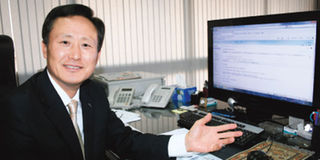South Korea enters the race for lucrative Kenyan contracts

PHOTO | WILLIAM OERI Mr Gang-Suk Suh, the managing director, Korea Trade Investment Promotion Agency (Kotra), speaks in his office in Nairobi on September 13, 2012.
What you need to know:
- South Korea aims to increase the presence of its medium-size companies in the country, largely in the manufacturing sector to leverage its regional competitiveness
- The managing director of the Korea business centre in Nairobi, Mr Gang-Suk Suh, said they have embarked on an aggressive drive to establish stronger trade ties with Kenya and with the East African Community
- Asked if the drive was in competition with China that has bullishly penetrated most African economies, Mr Gang-Suk said Korea was not out to copy China which, he added, has had tendencies to target the lower end of the market
South Korea is angling for a larger share of the Kenyan market in a drive targeting investments in infrastructure projects under the vision 2030 development blueprint.
The Asian economic giant also aims to increase the presence of its medium-size companies in the country, largely in the manufacturing sector to leverage its regional competitiveness.
According to the embassy in Nairobi, South Korea views Kenya as a hub to raise and exert its trade influence in East and Central Africa even as other developed economies, including Asian rivals China and Japan, look out for opportunities to ride on the projected economic boom for the continent.
Trade ties
The managing director of the Korea business centre in Nairobi, Mr Gang-Suk Suh, said they have embarked on an aggressive drive to establish stronger trade ties with Kenya and with the East African Community.
The Nairobi office falls under the Korea Trade Investment Promotion Agency (Kotra) and handles operations in Uganda, Syechelles, Mauritius, Comoro, DRC, Congo, Burundi and Rwanda.
Tanzania’s business has also been handled from Nairobi until last week when Kotra launched an independent office there.
Mr Gang-Suk recently led a Korean team that held consultations with representatives of more than 250 Kenyan companies and government officials.
Top-ranked companies
The Korean team comprised representatives from the country’s top-ranked 13 companies eyeing the huge contracting jobs and a trade delegation with 15 members from a wide range of businesses.
The Kotra chief chaired the Kotra/Africa conference at Safari Park Hotel where its 13 Africa offices reviewed their progress and presented plans for trade and investment in the years ahead.
In an exclusive interview with the Sunday Nation, Mr Gang-Suk said the engagements culminated in the signing of an MoU for the establishment of world class logistics centres in Mombasa and Nairobi with Pantos Logistics, which entered the EAC market last year.
“The logistics centre will be crucial to our business as we look forward to secure projects in railroad and transportation, pipeline, port and harbour construction as well as highway development,” said Mr Gang-Suk. He said a Korean company will partner with Pantos.
Vision 2030 director general Mugo Kibati separately told the Sunday Nation that the Pantos MoU was testimony to success in marketing Kenya as a regional logistics hub.
“Korea is one of those economies that recorded rapid growth in the last 30 years and is very important to our young economy,” said Mr Mugo. He said talks were ongoing for Korea to invest in a modern science and technology park in Konza city and in long-term projects in steel manufacturing and nuclear power generation.
“Korea’s intention to establish manufacturing and processing firms locally will boost our march to becoming an industrialised economy, help create jobs and minimise capital flight,” said Mugo.
Mr Gang-Suk said their immediate interests are in the Nairobi commuter railway system, the Lamu port, Konza city and expansion if airports.
“Many Korean companies are already engaging in talks to partner in manufacturing for export and also for local consumption,” he said.
“The challenge for Kenya now is to deepen its industrial base and create more jobs for the thousands of its unemployed youth. We believe that by investing here we will offer a win-win situation to Korea and Kenya businesses.”
Infrastructure projects
Korean companies, he said, were negotiating to secure funding from the oil-rich Arab endowment funds to finance some of their infrastructure projects in Kenya.
“I have seen good plans in Vision 2030 but not where all the needed billions will come from. It is imperative for Kenya to look beyond its traditional lenders like the World Bank, Africa Development Bank and donor countries,” Mr Gang-Suk noted.
Asked if the drive was in competition with China that has bullishly penetrated most African economies, Mr Gang-Suk said Korea was not out to copy China which, he added, has had tendencies to target the lower end of the market.
“Ours is a totally different approach and we seek not to intoxicate the local market but help bridge gaps in finance, technology and human resource while attaining top quality production standards that meet existing global rating,” he said.
Additionally, he said, Korean businesses would help Kenya attain its quotas in preferential trade arrangements like AGOA with the US and EPAs with Europe. But he admitted that Korea was looking for ingenious means to create investment opportunities abroad for thousands of its companies that have lost out to stiff competition inside China.
Saturated market
“Many of our firms helped China grow but the market is now saturated and has become expensive due to Chinese controls,” he said.
He appealed to the Kenyan Government to lower the business costs for foreign companies seeking to set base locally, citing exorbitant immigration and land lease fees. “Security is another problem requiring serious intervention,” said Mr Gang-Suk.
Mr Gang-Suk said the recent launch of a direct flight to Nairobi from Seoul has raised passenger flows and even made it cheap to fly to neighbouring China and Japan.
“With this flight we will soon start airlifting fresh flowers from Nairobi as opposed to Amsterdam.”



